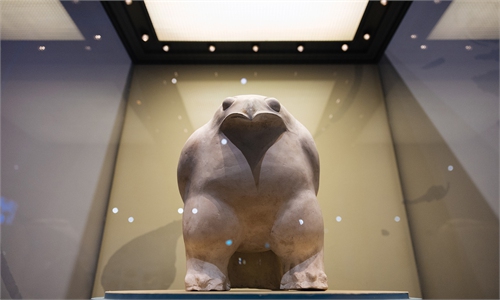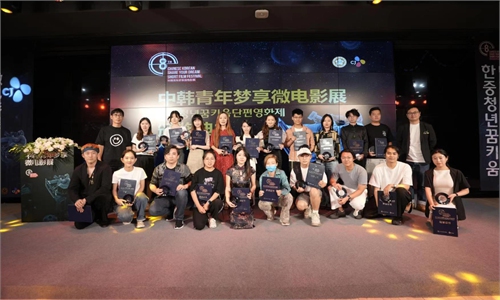Veteran stand-up comedian witnesses boom of China’s live performance scene enthralling both young and old
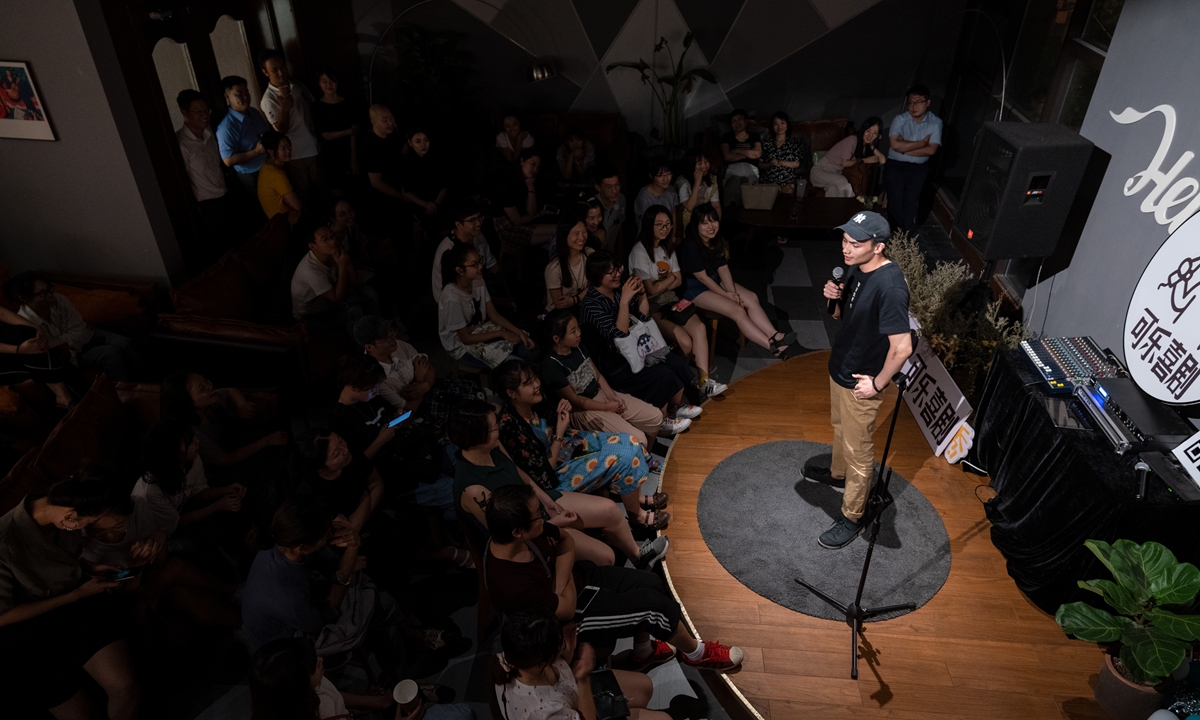
An “open mic” performance in Xi’an, Northwest China’s Shaanxi Province in August 2019 Photo: VCG
Editor's Note:
Over the last decade, China has witnessed tremendous changes, which could not have been achieved without the hard work of its people.
There are many ways to record the last decade, but the story that, at times, leaves a mark on each person is surely the most vivid. To greet the 20th National Congress of the Communist Party of China (CPC) scheduled to be held later this year, the Global Times has launched a series of stories to acknowledge the remarkable contributions made by people from all walks of life who have dedicated their wisdom and energy to the realization of the Chinese Dream.
In this installment, a stand-up comedian based in Beijing talks about how his talk show has enjoyed remarkable success in the last decade across China, reflecting the growing prosperity of China's cultural industries in the same period.
"Guess what my profession is. You may not believe it but I am actually a university philosophy teacher," "Look at my muscle. Yeah, I am a fitness instructor helping get bodies into shape."
Xijiangyue sat under the stage and carefully observed performers from different industries, many of whom rushed to the show for a stand-up comedy performance after the end of their own work day.
Xijiangyue's stand-up comedy club, Beijing Talk Show Club, offers an "open mic" performing opportunity to stand-up comedy enthusiasts, "even if the takings from each open mic cannot even make ends meet," the founder of the club told the Global Times recently.
More and more people of various ages and from different professional backgrounds are trying to make the leap into stand-up comedy. They need an open platform with a low entry bar.
The increasing number of comedy performers is a sign of the burgeoning stand-up comedy scene in China over the past 10 years.
At least 10 stand-up comedy outfits presently sell tickets publicly in Beijing and each of them can schedule three shows in different theaters on the same day, according to the Beijing News. If a performance contains 100 audiences and 10 actors, there can be at least 3,000 audience members and hundreds of performers involved in the cottage industry every Saturday and Sunday in the capital.
The Beijing Talk Show Club is one of the oldest such outfits among industry insiders, and as its founder, Xijiangyue has been in the stand-up comedy industry for 13 years and seen as one of the old hands at the craft in China.
Many well-known Chinese stand-up comedians, such as Yang Li who skyrocketed to popularity by focusing on gender-based topics, started their career in Xijiangyue's club. "I still remember their performances at the very beginning," Xijiangyue said, explaining the development path of Chinese stand-up comedy and the growth of Chinese audiences with the Global Times.
Over the last decade, the Chinese cultural and tourism industries have been gradually improved and regulated, along with the growth of the industry, Rao Quan, deputy head of the Ministry of Culture and Tourism of China, noted at a press conference on Wednesday.
"The cultural and tourism industries have become the new driving force and engine of economic growth in China," Rao said.
Growing together
The Beijing Talk Show Club was found by Xijiangyue in July 2010 and before that, China just had one stand-up comedy club called Takeout Comedy in Shenzhen, South China's Guangdong Province, which was a branch of the head office in New York.
But North China was a barren land when it came to stand-up comedy, which became one of impetuses for Xijiangyue's decision to establish the club as "Chinese culture or language is more complicated, so there may be more room for stand-up comedy to express things. And what no one has done before can engage me more."
He clearly remembers the time when the club had just been established, and a time when the club's claim to fame was tenuous as it only had two members including him. They both were responsible for running the club and performing.
They rented a space at a folk bar in Beijing for 500 yuan ($75) a night. The first wave of audiences was a smattering of customers at the bar.
Xijiangyue stood on the stage and performed for five audience members for the first time in 2010. He recalled framing his set around the theme of Chinese people's sense of humor.
"The number of audiences surprised me because I had predicted there were just two people, but their reactions after my jokes let me down. Maybe the content was too academic so it didn't elicit the exact same reaction I had been expecting."
Xijiangyue has never stopped researching what kind of stand-up comedy shows are likely to capture Chinese people's tastes and interests. After three months, he said that he began to feel the change and the number of audience members finally started increasing and filling in the bar.
Chinese audiences can accept new things quickly, the comedian said, especially those who are from megacities such as Shanghai. Xijiangyue remembers his first wave of followers included a couple living in Shanghai.
Xijiangyue finally explored a mode of performing stand-up comedy for Chinese people, which is interactive with audience members during the show. "I was the first one to make the opening interaction in stand-up comedy," he said. The performance effect was unexpectedly good.
Xijiangyue sat under the stage and carefully observed performers from different industries, many of whom rushed to the show for a stand-up comedy performance after the end of their own work day.
Xijiangyue's stand-up comedy club, Beijing Talk Show Club, offers an "open mic" performing opportunity to stand-up comedy enthusiasts, "even if the takings from each open mic cannot even make ends meet," the founder of the club told the Global Times recently.
More and more people of various ages and from different professional backgrounds are trying to make the leap into stand-up comedy. They need an open platform with a low entry bar.
The increasing number of comedy performers is a sign of the burgeoning stand-up comedy scene in China over the past 10 years.
At least 10 stand-up comedy outfits presently sell tickets publicly in Beijing and each of them can schedule three shows in different theaters on the same day, according to the Beijing News. If a performance contains 100 audiences and 10 actors, there can be at least 3,000 audience members and hundreds of performers involved in the cottage industry every Saturday and Sunday in the capital.
The Beijing Talk Show Club is one of the oldest such outfits among industry insiders, and as its founder, Xijiangyue has been in the stand-up comedy industry for 13 years and seen as one of the old hands at the craft in China.
Many well-known Chinese stand-up comedians, such as Yang Li who skyrocketed to popularity by focusing on gender-based topics, started their career in Xijiangyue's club. "I still remember their performances at the very beginning," Xijiangyue said, explaining the development path of Chinese stand-up comedy and the growth of Chinese audiences with the Global Times.
Over the last decade, the Chinese cultural and tourism industries have been gradually improved and regulated, along with the growth of the industry, Rao Quan, deputy head of the Ministry of Culture and Tourism of China, noted at a press conference on Wednesday.
"The cultural and tourism industries have become the new driving force and engine of economic growth in China," Rao said.
Growing together
The Beijing Talk Show Club was found by Xijiangyue in July 2010 and before that, China just had one stand-up comedy club called Takeout Comedy in Shenzhen, South China's Guangdong Province, which was a branch of the head office in New York.
But North China was a barren land when it came to stand-up comedy, which became one of impetuses for Xijiangyue's decision to establish the club as "Chinese culture or language is more complicated, so there may be more room for stand-up comedy to express things. And what no one has done before can engage me more."
He clearly remembers the time when the club had just been established, and a time when the club's claim to fame was tenuous as it only had two members including him. They both were responsible for running the club and performing.
They rented a space at a folk bar in Beijing for 500 yuan ($75) a night. The first wave of audiences was a smattering of customers at the bar.
Xijiangyue stood on the stage and performed for five audience members for the first time in 2010. He recalled framing his set around the theme of Chinese people's sense of humor.
"The number of audiences surprised me because I had predicted there were just two people, but their reactions after my jokes let me down. Maybe the content was too academic so it didn't elicit the exact same reaction I had been expecting."
Xijiangyue has never stopped researching what kind of stand-up comedy shows are likely to capture Chinese people's tastes and interests. After three months, he said that he began to feel the change and the number of audience members finally started increasing and filling in the bar.
Chinese audiences can accept new things quickly, the comedian said, especially those who are from megacities such as Shanghai. Xijiangyue remembers his first wave of followers included a couple living in Shanghai.
Xijiangyue finally explored a mode of performing stand-up comedy for Chinese people, which is interactive with audience members during the show. "I was the first one to make the opening interaction in stand-up comedy," he said. The performance effect was unexpectedly good.

Xijiangyue in his club Photo: Li Hao/GT
The mode of interaction with audience members started from an occasional chat. Around 10 years ago, Xijiangyue promised a 90-minute performance to audience members but after talking for 30 minutes, he found that he had run out of content. He saw young people sitting in the first row and showed resourcefulness in the emergency.
"At first we did not have enough topics for a long-format show. Maybe because I was so nervous at that time, I suddenly asked a young man who was sitting close to me about his feelings about my performance. our interaction was unexpectedly very interesting and made others laugh, so I then talked with other audience members one by one," Xijiangyue recalled.
He gradually grasped the skill of interacting with audiences during the shows and even held a special performance that just aimed at communicating with audience members. Xijiangyue would pick audience members randomly and talk with them about different topics such as their jobs or marriages and would get reactions according to their responses.
The interaction could last for the whole 70-minute show and the effect stunned the stand-up comedian. Since his format shift a decade ago, Xijiangyue saw the growth of Chinese audiences, who became more experienced in answering his questions humorously.
Chinese audiences and stand-up comedians have grown together by exploring their roles within the construct of the comedy show. Audiences have become an important part of making shows successful.
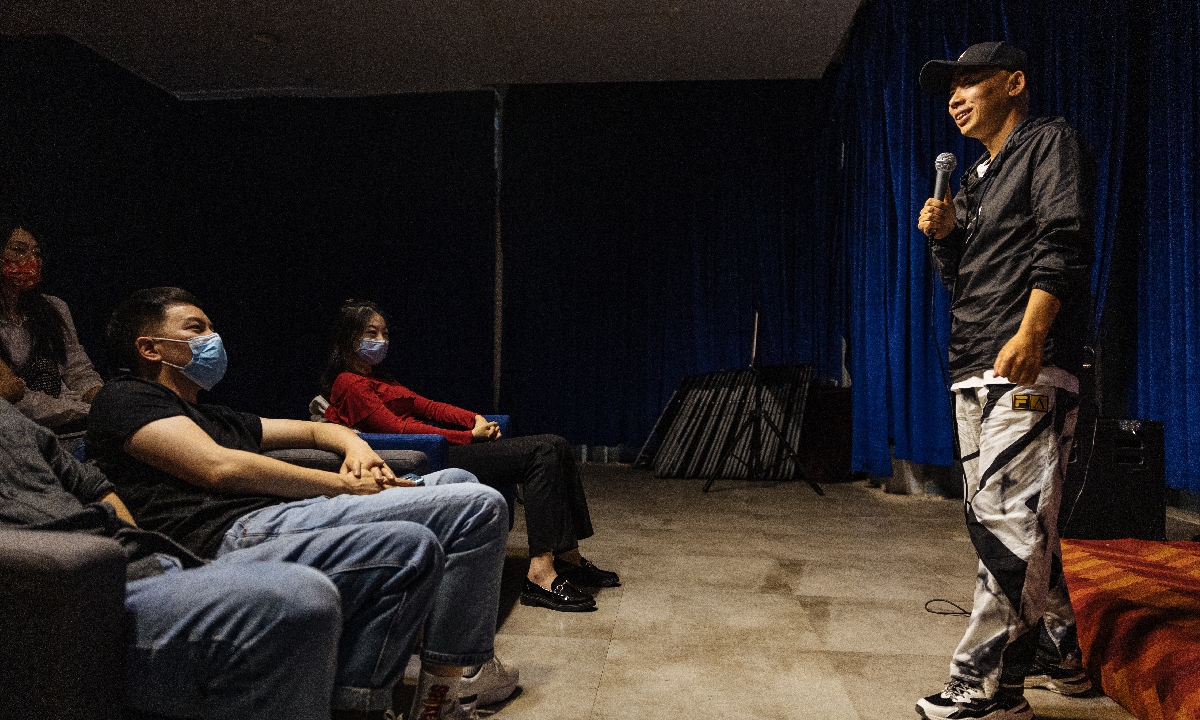
Xijiangyue performs at the stage. Photo:Li Hao/GT
Xijiangyue's club has featured more than 100 performers to date, some of whom are full-time while others are part-time performers. Although they have different identities and professions, their deep love to performing comedy is one and the same.
Trillion-yuan industry contribution
Rock and Roast, a comedy competition show that seeks to select a champion from among dozens of China's most brilliant stand-up comedians, has been a window through which Chinese audiences can familiarize themselves with stand-up comedy. Well-known Chinese stand-up comedians, including Yang Li and Li Dan, have both been featured on the online showcase.
Stand-up comedian Joe Wong, who has lived in the US and has many years of experience performing comedy, also returned to the stage of the popular show in the first episode of the show's fourth season.
Wong told the Global Times that during a comedy tour in China a few years ago, he noticed that the comedy industry in the country was rapidly advancing. Young Chinese comedians are learning from outstanding comedians around the world and rapidly honing their comedic skills.
During his national tour from 2013 to 2016, Wong found that most of his audience members were young people, but by 2018 he also started seeing an older crowd and even children.
Xijiangyue admitted that online shows such as Rock and Roast have deeply influenced the development of Chinese stand-up comedy as it provides an opportunity for a wider audience to watch the programs and know the form of comedy on the internet without limitations on time and space.
Realizing the impact of online and TV shows, Xijiangyue also brought his team on board the production of these programs since 2015. They combined different platforms, including the video platform iQIYI, the Guizhou TV Station, and the Xinhua and the People's Daily websites, to use a variety of channels to promote stand-up comedy.

Xinjiangyue Photo: Li Hao/GT
Through Xijiangyue's tireless efforts and those of other Chinese comedians, the form of stand-up comedy has blossomed in China and will get "more and more popular because it offers a method for China's younger generations to express themselves," Xijiangyue predicted.To maintain the vitality of the industry, Xinjiangyue's club has been trying to train more talent on performing stand-up comedy who are creative and willing to show themselves.
When an open mic performance ended at 9 pm on April 22, Xijiangyue found one of the performers, who said she was a university professor of philosophy, backstage and talked with her about the hits and misses in her performance.
"I felt she has potential to become seasoned, so I tried to instruct her on the correct path to follow," he said.
"Yang Li and Zhou Qimo, the shining stars in Rock and Roast, both started their careers at the Beijing Talk Show Club. I still remembered what Yang was like when she first entered the club."
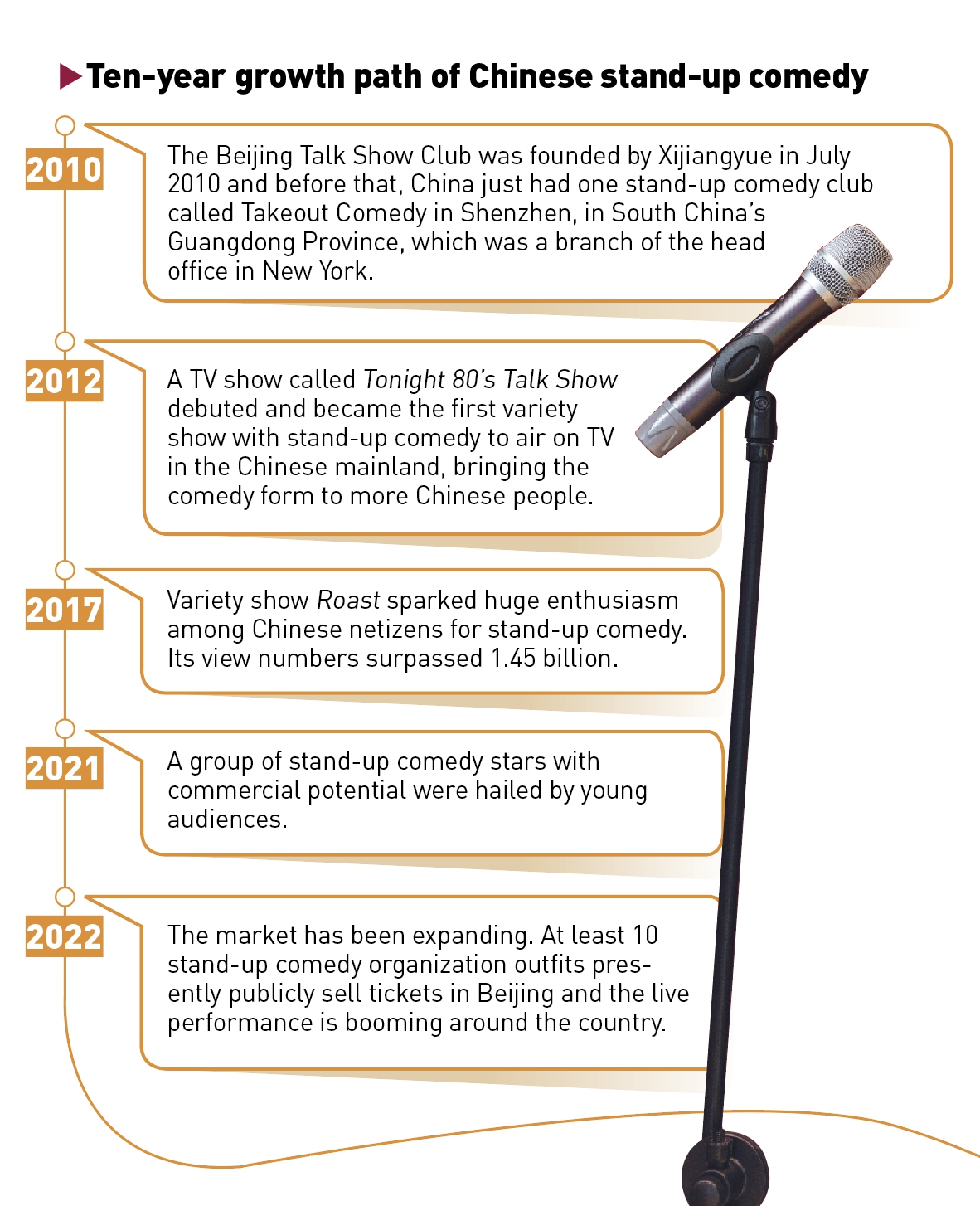
Xijiangyue recalled that he would often find time to give younger performers suggestions on their styles when the club's office was still located in a building on Guijie Street, a famous restaurant street in Beijing.
Yang asked for advice from the old head in his office on the second floor, but sometimes she would also question the instructions from Xijiangyue.
"She would question whether the version of scripts I would revise were not as good as what she wrote. She is an interesting person."
Xijiangyue praised the spirit of persistence of comedians in the industry, noting that some of them set off on the right performance style from the very beginning and do not veer off regardless of external factors. Persistence of industry insiders is an important factor in the industry's current prosperity.
The old hands, including Xijiangyue and Wong, are optimistic about the future of Chinese stand-up comedy and predict that it will be one of the biggest and most popular forms of entertainment in Chinese cities in the future.
In the last 10 years, the number of national-scale cultural enterprises has increased from 36,000 to 65,000, and total annual revenue has increased from 5.6 trillion yuan ($0.8 trillion) to 11.9 trillion yuan. China's foreign cultural trade volume exceeded $200 billion for the first time in 2021, according to Ministry of Culture and Tourism of China.
By the end of 2021, there were 191,000 cultural business institutions nationwide with more than 1.5 million employees. There are an estimated 16,000 art performance groups in the country, seeing an increase of 123.2 percent since 2012.

